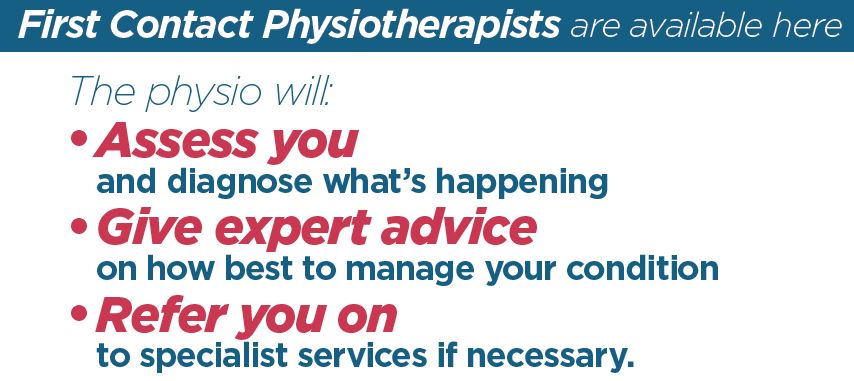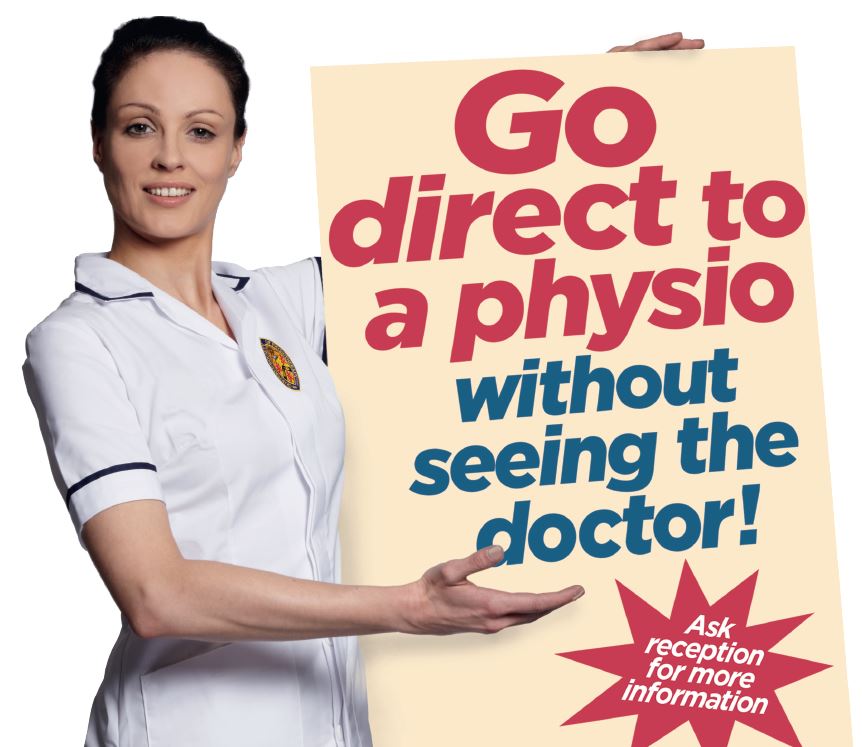Opening Times | Contact Us | Patient Access
CQC Rating Good
Physiotherapy
Physiotherapy is a science-based healthcare profession that promotes recovery from illness, injury, or disability. It aims to restore movement and functional ability to a person’s full potential. As an independent profession, physiotherapists make their own clinical judgments and treatment decisions. They continually assess treatment outcomes and adapt their approach to best support recovery.
Physiotherapists in the UK are HCPC-registered healthcare professionals who work with people of all ages, from newborns to the elderly. They adopt a holistic approach, closely involving patients in their own care. Also referred to as “PT” or “Physio,” they may work independently or as part of multidisciplinary teams alongside doctors, nurses, occupational therapists, psychologists, and others.
First Contact Physiotherapy
Low back and neck pain are among the leading causes of disability in the UK. Chronic joint pain and osteoarthritis affect more than 8.75 million people, and musculoskeletal (MSK) conditions account for 30% of all GP appointments.
To address this, all adults in England are now able to see a musculoskeletal first contact physiotherapist at their local GP practice without needing a GP referral.
Most first contact practitioners are physiotherapists with enhanced skills. They support patients with conditions such as back, neck, and joint pain by:
-
Assessing and diagnosing musculoskeletal issues
-
Providing expert advice on management strategies
-
Referring to specialist services when necessary
Patients can access physiotherapy directly through their GP practice, by speaking with a receptionist, or following a GP referral.
Benefits for Patients
-
Quick access to expert MSK assessment, diagnosis, treatment, and advice
-
Early intervention to prevent acute problems becoming chronic
-
Improved patient experience and outcomes
-
Fewer overall appointments and shorter care pathways
-
Clear, streamlined logistics reduce missed appointments and admin issues
-
Personalized advice on physical activity and lifestyle changes
-
Longer appointments that support patients feeling listened to and reassured
KCHFT MSK Outpatient Physiotherapy Self-Referral Service
Kent Community Health NHS Foundation Trust (KCHFT) provides a self-referral option for patients with musculoskeletal problems. This service allows individuals to access outpatient physiotherapy without needing to see a GP first.
How to Self-Refer
Patients can complete the referral form online:
MSK Physiotherapy Self-Referral Form
Conditions Treated
-
Muscle, ligament, and tendon injuries
-
Joint pain and osteoarthritis
-
Back and neck pain
-
Upper and lower limb conditions
-
Sports-specific injuries
-
Repetitive strain disorders
-
Chronic pain conditions
-
Post-surgical rehabilitation
Treatments Offered
-
Face-to-face and virtual individual treatment sessions
-
Personalized exercise programs
-
Education and advice sessions
-
Physiotherapist-led exercise groups
Clinic Locations
Services are available across Kent, including in:
-
Canterbury, Whitstable, Faversham, Herne Bay, Aylesham
-
Broadstairs, Margate
-
Tenterden
-
Deal, Folkestone, Dover
-
Gravesend, Sheppey
-
Aylesford, Tonbridge, Sevenoaks
•
We use cookies to help provide you with the best possible online experience.
By using this site, you agree that we may store and access cookies on your device. Cookie policy.
Cookie settings.
Functional Cookies
Functional Cookies are enabled by default at all times so that we can save your preferences for cookie settings and ensure site works and delivers best experience.
3rd Party Cookies
This website uses Google Analytics to collect anonymous information such as the number of visitors to the site, and the most popular pages.
Keeping this cookie enabled helps us to improve our website.



